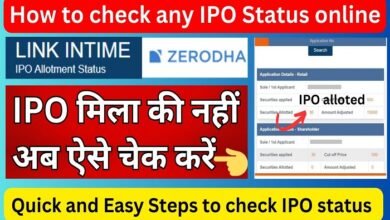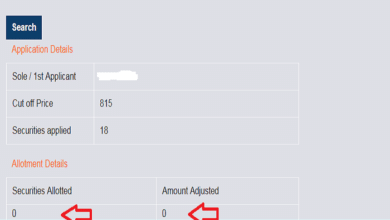Everything You Need to Know About Link Intime India IPO Allotment

The Indian stock market has witnessed a surge in initial public offerings (IPOs) in recent years, and one of the key players in the IPO process is Link Intime India IPO allotment. Link Intime India is a prominent registrar for several IPOs in India and plays a vital role in the allotment of shares to investors. If you are interested in understanding how the allotment process works, how to check your status, and what to expect, this comprehensive guide will provide all the details you need.In this article, we will explore the steps involved in Link Intime India IPO allotment, how it works, how to check the status of your allotment, and frequently asked questions that will help you navigate the IPO process with ease.
What is Link Intime India?
Before diving into the specifics of the Link Intime India IPO allotment, let’s first understand what Link Intime India is. Link Intime India is one of the leading registrar and transfer agents for IPOs in India. They are responsible for managing the entire process of IPO share allotment, from receiving applications to managing refunds and ensuring that the shares are allocated to the rightful applicants.As an authorized agency for various companies going public, Link Intime India plays a pivotal role in facilitating the IPO process. The company is known for its efficient services, which include managing and processing applications, handling refunds, and maintaining records related to the IPO.
How Does Link Intime India IPO Allotment Work?
Understanding how the Link Intime India IPO allotment process works is crucial for any investor participating in an IPO. When a company decides to go public, it appoints a registrar, such as Link Intime India, to manage the IPO process. This process includes collecting applications, processing them, and allocating shares to the applicants.
- Application Process: Investors apply for shares in the IPO through their brokerage accounts or directly through the application forms. They are required to provide personal and financial details and choose the number of shares they wish to apply for.
- Basis of Allotment: Link Intime India uses a method called the “proportional allotment” method for most IPOs. This means that the number of shares allotted to an applicant depends on the number of shares they have applied for and the overall demand for the IPO.
- Final Allotment: Once the IPO application deadline closes, Link Intime India finalizes the allotment. If the IPO is oversubscribed (i.e., more applications are received than shares available), the allotment is done on a pro-rata basis.
- Refund Process: If an applicant does not receive any shares or is allotted fewer shares than requested, the excess application amount is refunded. Link Intime India manages the entire refund process, ensuring that the money is returned to applicants in a timely manner.
How to Check Link Intime India IPO Allotment Status?
Once the IPO process is complete, you will want to know if you have received an allotment of shares. Fortunately, Link Intime India makes it easy to check the Link Intime India IPO allotment status.
To check your allotment status, follow these steps:
- Visit the Link Intime India Website: Go to the official website of Link Intime India (www.linkintime.co.in).
- Select the IPO: Find the IPO you applied for in the list of active and recent IPOs on the homepage. Click on the IPO name to access its allotment details.
- Enter Your Details: You will be asked to provide your PAN number, application number, or the depository participant (DP) ID. This information is needed to fetch your allotment status.
- Check Status: After entering your details, click on the submit button, and your IPO allotment status will be displayed. If you have been allotted shares, the number of shares allocated to you will be shown.
Factors Affecting Link Intime India IPO Allotment
The Link Intime India IPO allotment process is influenced by several factors. These factors determine how shares are allocated to applicants and why some may receive fewer shares than others.
- Oversubscription: When an IPO is oversubscribed, the demand for shares exceeds the number of shares available. In such cases, Link Intime India follows a proportional allotment method to allocate shares.
- Category of Investors: Investors can apply under various categories, such as retail investors, non-institutional investors, and qualified institutional buyers (QIBs). Each category may receive a different percentage of shares based on demand and allotment rules.
- Application Size: The number of shares applied for and the overall demand can affect the chances of allotment. Larger applications may have a lower chance of receiving full allotment.
- Retail Participation: Retail investors, who are individual investors applying for shares worth up to a specific limit, may have a higher chance of allotment if the IPO is under-subscribed or moderately subscribed.
Link Intime India IPO Allotment: Common Issues and Troubleshooting
While the Link Intime India IPO allotment process is generally smooth, there can be a few issues that investors encounter. These issues can range from problems with the application process to difficulty checking the allotment status. Here are some common problems and how to resolve them:
- Incorrect Details: If you have entered incorrect details while applying or checking your allotment status, the system may not display your status. Always double-check your PAN number, application number, or DP ID before submitting.
- Refund Issues: Sometimes, applicants may face delays in receiving refunds for unallotted or partially allotted shares. In such cases, you can contact Link Intime India’s customer service for assistance.
- Technical Difficulties: If the website is not loading or showing errors, try accessing it from a different browser or device. Ensure your internet connection is stable before checking your allotment status.
- Allocation Delay: Occasionally, there may be a delay in the allotment process, especially for large IPOs. If there is no update, it’s best to wait a few days before checking again or contacting customer support.
Link Intime India IPO Allotment: Refund Process
After the Link Intime India IPO allotment, applicants who have not been allotted any shares or have been allotted fewer shares will receive a refund for the excess amount they paid. Here is how the refund process typically works:
- Refund Method: Link Intime India usually processes refunds via electronic transfer (NEFT or RTGS) to the applicant’s registered bank account. In some cases, a physical refund cheque may be issued.
- Refund Timelines: Refunds are generally processed within 6 to 7 working days from the date of allotment. However, the timeline may vary depending on the IPO and the registrar’s efficiency.
- Checking Refund Status: To check the status of your refund, you can visit the Link Intime India website and use the “refund status” option. Enter your application details to find out if your refund has been processed.
Conclusion
The Link Intime India IPO allotment process is an essential part of the IPO journey. It ensures that shares are distributed fairly to investors and that everyone receives their allotment in a timely and efficient manner. Understanding the allotment process, how to check your status, and how to resolve common issues can make your IPO experience much smoother.By following the steps outlined in this guide, you can ensure that you are well-prepared for your next IPO investment. Whether you’re a first-time investor or a seasoned participant, knowing how to navigate the Link Intime India IPO allotment process is crucial for making informed decisions.
FAQs
1. What is Link Intime India’s role in IPO allotment? Link Intime India acts as the registrar for IPOs, managing the allocation of shares, processing applications, and handling refunds for unsuccessful applicants.
2. How can I check my Link Intime India IPO allotment status? You can check your allotment status by visiting the Link Intime India website, entering your application or PAN details, and checking the status of your IPO.
3. How are Link Intime India IPO allotments made? Allotments are generally made on a pro-rata basis, especially when the IPO is oversubscribed. The number of shares allotted depends on the demand and the applicant’s application size.
4. Why did I not get the full allotment in Link Intime India IPO? If the IPO is oversubscribed, applicants may receive fewer shares than they applied for. The allotment is made based on a proportional system.
5. How long does the Link Intime India refund process take? Refunds are typically processed within 6 to 7 working days from the date of allotment. If there is a delay, you can check the status on the Link Intime India website.





